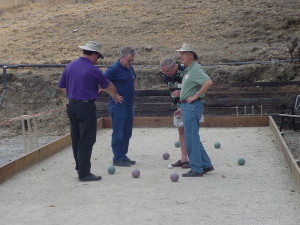Bocce, a Social and Athletic Tradition
Posted on November 22nd, 2013 by Anna in Uncategorized | No Comments »
On Sunday visits to Little Italy while growing up, I was always struck by the image of local old men playing bocce in the center of the neighborhood. (They were always grandfathers—one of the requirements of playing bocce publically seemed to be you had to be at least sixty years old.) They would toss red and green ceramic balls into the square patch of sand and then sit out their turns in lawn chairs, drinking strong coffee from the nearby Vacarro’s café. Bocce, I always figured, was the Italian-American version of dominoes—it took depth perception and keen judgment but not an enormous amount of athletic prowess. At the same time, it was sporty enough to inspire all sorts of competition between different teams, with bets being placed and good-natured joshing firing off left and right between opponents.
The game of bocce dates back to the Roman Empire, named after the word boccia, Italian for “bowl,” and records exist of Roman soldiers playing bocce with stones in between fighting with the Carthaginians during the Punic Wars in 264 BC. Like many Italian customs, it has since then spread internationally through Italian immigrants and is currently popular worldwide, especially in countries to the east of Italy such as Croatia, Montenegro, and Bosnia. The aim of the game in bocce is to throw a ball that weighs roughly three pounds down the length of a playing field about 90 feet in length, having it land as close as possible to a small, white ball called the boccino or pallino. People can play individually or in teams of up to eight players, and the first team who reaches twelve points wins.
While the sport of bocce is closely related to the British game “bowling on the green,” it is much more refined, requiring skill, strategy, and cunning. In fact, while bocce is played by many for both exercise and relaxation, it has shown great health benefits for elderly players—not only does it get you outdoors and interacting with other people, (which studies have shown can be a powerful asset against Alzheimer’s, as it keeps your mind and body active,) but it was declared by the Montpelier Medical Faculty in France to be the best exercise to prevent rheumatism.
As a child, I remember my grandfather taking part in local bocce tournaments—my grandmother approved because it got him out of the house and there was little to no risk of him injuring himself—and we would all tag along to support him. Tournaments were always very sociable, night-time events held in the center of Little Italy where all the players’ families would show up with food and wine. They would turn into miniature festivals with music and dancing as people got more and more excited over the turnout of the games. Moreover, the tournaments drew fantastic business for the surrounding restaurants and cafes, making it a win-win situation for everyone. Not only was it a good excuse for people to get together and have a good time, but it was a hands-on, energetic way of celebrating our heritage.






